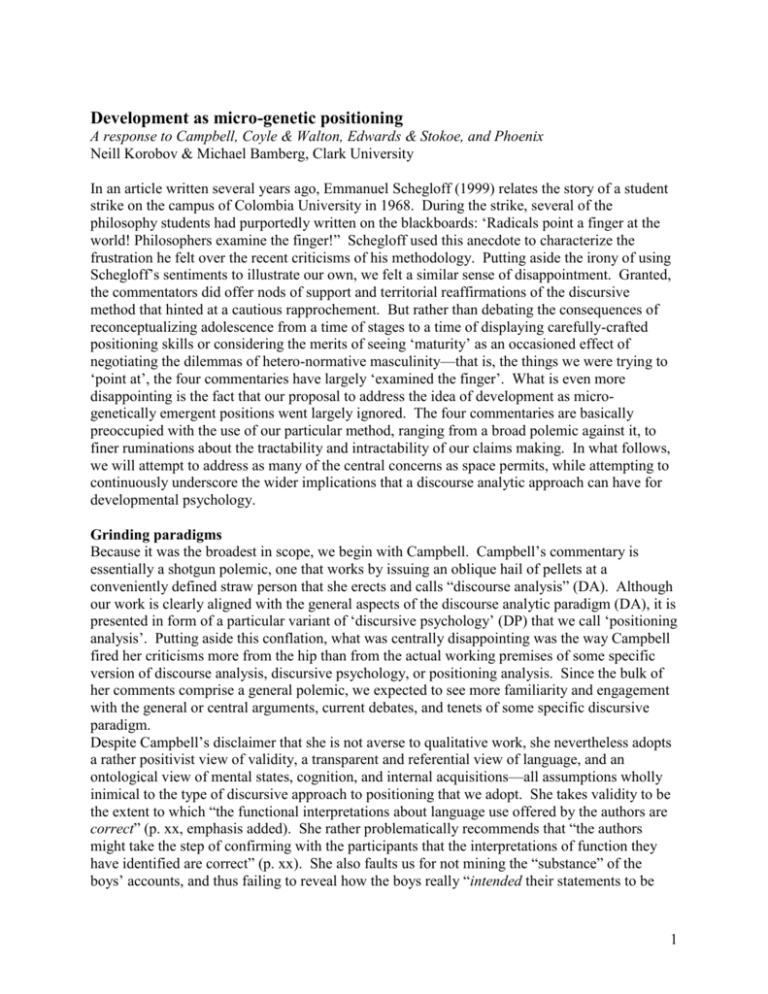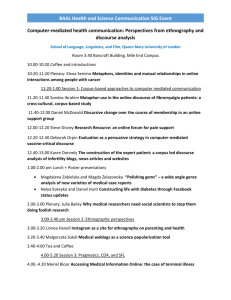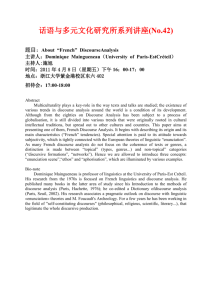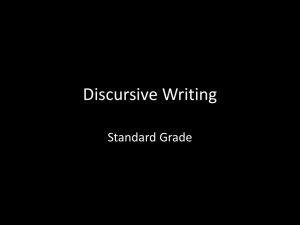Development consists in increasingly broadened
advertisement

Development as micro-genetic positioning A response to Campbell, Coyle & Walton, Edwards & Stokoe, and Phoenix Neill Korobov & Michael Bamberg, Clark University In an article written several years ago, Emmanuel Schegloff (1999) relates the story of a student strike on the campus of Colombia University in 1968. During the strike, several of the philosophy students had purportedly written on the blackboards: ‘Radicals point a finger at the world! Philosophers examine the finger!” Schegloff used this anecdote to characterize the frustration he felt over the recent criticisms of his methodology. Putting aside the irony of using Schegloff’s sentiments to illustrate our own, we felt a similar sense of disappointment. Granted, the commentators did offer nods of support and territorial reaffirmations of the discursive method that hinted at a cautious rapprochement. But rather than debating the consequences of reconceptualizing adolescence from a time of stages to a time of displaying carefully-crafted positioning skills or considering the merits of seeing ‘maturity’ as an occasioned effect of negotiating the dilemmas of hetero-normative masculinity—that is, the things we were trying to ‘point at’, the four commentaries have largely ‘examined the finger’. What is even more disappointing is the fact that our proposal to address the idea of development as microgenetically emergent positions went largely ignored. The four commentaries are basically preoccupied with the use of our particular method, ranging from a broad polemic against it, to finer ruminations about the tractability and intractability of our claims making. In what follows, we will attempt to address as many of the central concerns as space permits, while attempting to continuously underscore the wider implications that a discourse analytic approach can have for developmental psychology. Grinding paradigms Because it was the broadest in scope, we begin with Campbell. Campbell’s commentary is essentially a shotgun polemic, one that works by issuing an oblique hail of pellets at a conveniently defined straw person that she erects and calls “discourse analysis” (DA). Although our work is clearly aligned with the general aspects of the discourse analytic paradigm (DA), it is presented in form of a particular variant of ‘discursive psychology’ (DP) that we call ‘positioning analysis’. Putting aside this conflation, what was centrally disappointing was the way Campbell fired her criticisms more from the hip than from the actual working premises of some specific version of discourse analysis, discursive psychology, or positioning analysis. Since the bulk of her comments comprise a general polemic, we expected to see more familiarity and engagement with the general or central arguments, current debates, and tenets of some specific discursive paradigm. Despite Campbell’s disclaimer that she is not averse to qualitative work, she nevertheless adopts a rather positivist view of validity, a transparent and referential view of language, and an ontological view of mental states, cognition, and internal acquisitions—all assumptions wholly inimical to the type of discursive approach to positioning that we adopt. She takes validity to be the extent to which “the functional interpretations about language use offered by the authors are correct” (p. xx, emphasis added). She rather problematically recommends that “the authors might take the step of confirming with the participants that the interpretations of function they have identified are correct” (p. xx). She also faults us for not mining the “substance” of the boys’ accounts, and thus failing to reveal how the boys really “intended their statements to be 1 heard” (p. xx, emphasis added). The result, as Campbell would like us to believe, is that we have flunked the validity test, and have perilously invited a free-for-all, unbounded contextual relativism. In discursive work, the validity test is not satisfied through ‘correct’ referential mapping onto what the participants truly meant, but through a different set of criteria (see Potter, 1996) that Campbell is either unaware of or chooses to ignore. As Coyle and Walton note in their commentary, these criteria have to do with how well the action-orientation of participant talk is described, the extent to which the analyses demonstrate (by pointing to actual data) how claims were generated, whether it invites reflexive re-interpretations, whether it builds on previous research, and whether it provides a model for analyzing similar segments of data. Had this been the criterion by which Campbell assessed the validity of our work, we might have had more to debate (which we do with the other commentators). Second, Campbell adopts a rather transparent view of language in order to assess discursive work. Again, this is dangerously inappropriate. Contrary to most discursive work, her qualitative approach takes “informants’ statements seriously as genuine reports of their experience (p. xx).” She also argues that questionnaire items are “transparent” to the participants, and faults our method for being too covert, and our analyses for not treating the boys talk as “windows” into their lived experience (p. xx). In contrast to this referential and transparent view of language, our discursive approach treats language as ‘constitutive’, as always ‘doing’ something socially, as opposed to reflecting something that is already internally held. Seen this way, our interest in how the boys use certain rhetorical devices to bring off certain types of positions that anticipate and deflect potential counters is entirely consonant with a ‘constitutive’ view of language as a tool for conducting social business. Again, Campbell’s criticisms turn on assumptions that fail to meet discursive research on the very grounds upon which it purports to stand. A third issue for Campbell is reflected in her queries about the type of ‘social mind’ envisioned by discourse analysis. She assumes that we must have some version of mind, because otherwise how could we account for the participants’ impressive ability to query, dispute, and so on. By urging us to account for this, she lays an ‘ontology’ trap. To avoid this, it must be stressed that discursive psychology is a fully epistemological project, not an ontological one. As such, it does not attempt to explain the status of things like ‘minds’, nor does it advance the spurious argument that minds simply get ‘produced’ or ‘revealed’ in talk. Discursive psychology is interested in how people use psychological phenomena as discursive topics in order to get things done in talk, and thus avoids positing a general theory about the ontological status of these phenomena. As an epistemological project, discursive psychology is useful for analyzing how knowledge claims get made, rejected, or accepted as part of the maintenance of social life, and thus treats the objects of ‘mental life’ as topics that get practiced in talk. Seen this way, Campbell’s charge (p. xx) that our notion of mind is nothing more than mere “word games” that distract psychologists from “very real” adolescent problems is not only a cheap piece of death and furniture rhetoric, but is more fundamentally a moot point. Overall, Campbell’s polemic against discourse analysis is eerily reminiscent of Archer’s (2004) recent diatribe against social constructionist qualitative research. In our estimation, both are highly problematic because they both erect a glut of false targets. Nowhere is this more evident than in Campbell’s section on ‘insularity’, a section that is essentially a paraphrase of Archer’s (2004) overall argument. She claims (p. xx) that we take “the hypothesis that gender is a social construction as an established fact”, a proposition that she claims naively insulates us from a world of evolutionary, biological, and cross-cultural research. Nowhere do we posit 2 anything so ridiculous sounding. Archer (2004) advances a series of similar gross misrepresentations as he contends that qualitative work attempts to replace quantitative work (p. 133, emphasis added), that it assumes that social construction is the primary process for understanding gender (p. 133, emphasis added), that it assumes that gender can be understood solely in terms of social discourse, and that gender is constructed anew in each social interaction (p. 136, emphasis added). Like Campbell’s assertion, each of these types of arguments infuse a false sense of foundationalism into qualitative work, something that (ironically) has itself been highly criticized by the qualitative turn in the social sciences. Our interest is in exposing what often gets ignored by most social scientific instrumentation—that is, how gender gets socially and culturally constructed. We are not interested in advancing a general theory that states that gender is, in fact, a social construction and nothing more. While we do take issue with methodologies that obscure or wash out the ‘how’ question, we are not trying to advance a foundationalist theory of gender. Eclecticism and CA-inspired DP Edwards and Stokoe’s commentary, in contrast, represents a highly narrow discussion of several of the more interesting in-house debates amongst researchers working within different discourse analytic traditions. While we expected their reiteration and rubber-stamping of our alignment with discursive psychology (though not necessarily our version of ‘positioning analysis’), we felt that it was done in a spirit of gate keeping that might convince scholars that discursive work is overly narrow and thus a bit off-putting. Edwards and Stokoe argue for a specific type of approach to discourse analysis that is conversation analytically (CA) informed, and as such, issue a series of critiques that essentially fault our discursive approach for not being conversation analytic enough. As a result, they claim that our version of positioning analysis is not simply outdated, but also too eclectic and too preoccupied with materials ‘got up’ by researcher involvement. To be very clear right up front, our goal was to appear sufficiently open to other discourse traditions, to encourage an expansion (rather than foreclosure) of integration and crossfertilization between developmental and discourse theorizing. However, as a preliminary response to this critique of eclecticism, we must say that we found it very difficult to see where, in our actual analyses, different traditions butted up against one another in ways that necessarily damaged our analyses. While they charge that some of our claims about ‘maturity’ were overly analyst-imposed, they do not show how that is a problem that is necessarily the result of us mixing incompatible traditions or methodologies and then applying them to the analysis of positioning strategies. As such, we will proceed by treating their remonstration as a veiled euphemism for gate keeping and will thus reflect on it at this more prosaic level. We agree that methodological eclecticism can at times lead to incoherence. Eclecticism can wash out systematic and interpretive accountability, thus flirting unproductively with the kind of interpretive free-for-all that makes qualitative research look capricious. But we agree with Potter (2003a, p. 784) who states that “discourse analysis is both a boon and an encumbrance”. Potter argues that it is a boon in the sense that it allows different forms of work to mesh, bump, and coalesce with one another. And, Potter (p. 784) states, “it is an encumbrance when treated as a singular thing without appreciating the consequences of its diversity”. In other words, discursive psychology in general and positioning analysis in particular are not singular methods, nor are they even properly speaking methods at all, but rather a range of theoretical and meta-theoretical assumptions that are methodologically useful. As such, the point at which to protect against the dangers of eclecticism is not at the methodological level of delimiting an 3 exact recipe for conducting analysis, but rather ought to exist more broadly at the level of guarding against intermingling with other traditions that altogether presuppose a different view of discourse or language than is adopted by most discursive work (see Potter, 2003a). It is at this level where eclecticism becomes a recipe for incoherence. While our type of analyses admittedly incorporates aspects of ‘critical’ discursive work (similar to Wetherell & Edley, 1999), this is not tantamount to incompatible views of discourse. Our central commitment to treating discourse and language as a pragmatic and ‘constitutive’ medium for conducting social action is retained. To the extent, then, that we incorporate the commensurate features of other traditions is something that we feel reflects an important and salubrious step towards integrating discursive work with other trends in developmental thinking. Our goal is to open up a space for different discourse analytic traditions, to encourage a shared aesthetic for a range of approaches, and to avoid border wars with rival discursive methodologies (see Silverman, 1999). If this openness is problematic for advancing the exclusive use of conversation analytic techniques for discursive work, then this is a consequence that we can live with, quite happily, we might add. Our development of positioning analysis is one place where we are attempting to bridge such traditions. Edwards and Stokoe claim that our version of positioning brings with it a purported ontology of selfhood that makes it incompatible with the anti-ontological nature of their discursive position. Their issue is the extent to which we equivocate between methodological and philosophical relativism—that is, the extent to which we are guilty of ‘ontological gerrymandering’, an issue common in recent discussions (see Hammersley, 2003a,b,c; Potter, 2003a,b). Although there is not sufficient space to address the full scope of this issue, we think that Edwards and Stokoe’s charge that we are blatantly abstracting out an ‘emphatic’ (or philosophical/ontological) theory of ‘the fragmented self’ is overstated. While ontology is definitely apart of Harré’ and van Langenhove’s (1999) theory of positioning, we do not assume, a priori, that all selves are inherently fragmented or coherent. We argue, in fact, for a ‘disrupting’ of all ontological accounts of selfhood (similar to Butler’s 1995 position). Our view of positioning states that selves, in their empirical instantiation, get fragmented and consolidated, and it is exactly the discursive processes by which this occurs that we are interested. As such, our discussion of positioning attempts to account for the active/agentive notion of selves-in-the-making—as empirical phenomena, not ontological ‘things’. In doing this, we are attempting to tie positioning in with a ‘micro-genetic’ view of identity development. This was one of the central endeavors of our article. We are thus not typical discourse analysts with a typical discursive agenda of analyzing conversational structures and sequences. We are psychologists interested in how people (here, boys) position themselves and others across local social interactions and, referentially, in their talk; and how, in so doing, different forms of identities get tried out, resisted, and consolidated—in short, how identities develop (see Bamberg, 2003, 2004). We are thus interested in honing discursive tools to do micro-developmental ‘identity analysis’. This is an essential point, and is one that we will come back to and flesh out towards the end of this response. Good and bad data Edwards and Stokoe’s discussion of the relationship between data sources (like focus groups) and their analyses reflects another enormously complex set of issues. Applied to the present study, Edwards and Stokoe are essentially troubled by our use of the term “everyday” (which is only used once!) to describe the types of interactive social practices that we claim to be analyzing in this particular study (p. xx). Since these are adult-moderated group discussions (and 4 not focus groups in the traditional sense), they believe it is inappropriate to intimate that we are analyzing ‘everyday’ interactive social practices. Point well taken. But aside from this one instance on p. xx, in every other instance throughout the article when we are talking about our specific study, we are very clear to note that we are analyzing group discussions, that we are looking at how the boys fashion particular types of responses to actual or anticipated challenges. The explicit grounding of this type of researcher-guided talk, and of the boy’s perspectives in response to this particular context, is not downplayed, but emphasized and continuously made part of the analysis. So why all the concern? To answer this, we need to take a step back and look at the fine line Edwards and Stokoe are trying to walk. They are smart to claim (p. xx) that the issue for them is not whether focus group talk is ‘unnatural’ while other types of talk are ‘natural’, but rather is about the type of claims we are warranted to make about talk that is ‘worked up’ with respect to researcher agenda and topic control. The problem is that they are not careful to keep the discussion at this level, but instead lapse into promoting differences based in a basic preference for certain types of data, rather than in what we do with the data. Edwards and Stokoe openly admit a preference not simply for analyses that are sensitive to the given data types, but go further by advancing a general preference for data types that pass the ‘dead social scientist test’—that is, talk that would have occurred ‘had the researcher not been born’. They clearly repeat the conversation analytic slogan when they admit a general preference for “everyday talk that is not produced for research purposes” (p. xx). On what basis is the general acceptance of this slogan defended? Certainly it would not be on the basis that ‘everyday talk’ is less biased by researcher intervention (and thus more ‘natural’), because discursive researchers generally argue that bias in the form of ‘context effects’ is an inevitable part of all interaction, and should thus be explored and celebrated rather than eliminated (Speer, 2002). And to suggest that ‘everydayness’ is itself a label for types of settings where things ordinarily and functionally occur is circular, because it would require one to know in advance what ‘ordinariness’ is and thus where you would find it. Justifications for this inevitably stall and become uninteresting and incoherent. While Edwards and Stokoe suggest that their preference for non-researcher influenced ‘everyday talk’ is not based in it’s inherent ‘naturalness’, they do not follow through on this argument consistently, and instead make comments that promote a preference for data types that are defined by the role of the researcher. The danger is that readers will come away with the impression that the data become better for getting at participant orientations as the role of the researcher is minimized. In contrast, and in line with Speer (2002) and Potter (2002), we argue that what makes an analyses ‘good’ is not the extent of the researchers involvement or noninvolvement, but rather lies in what we do with the data in our analyses. This is a fine point that needs to be more carefully woven into discussions about preferences for data types. We are, nevertheless, grateful to Edwards and Stokoe for initiating this discussion. It is important, and their cautionary remarks about our own analyst-impositions and potential inconsistencies are well taken, and are a topic to which we will now turn. But before we do, we join with Speer (2002) who recommends that discourse analysts should do as much (or more) to carefully define and defend their slogans as they do to reproduce them. Is this about maturity? At least three of the four commentaries aggressively question the necessity of using the notion of ‘maturity’ to describe the boys’ positions. While Phoenix grants that we convincingly show how Don (in extract 1) eschews maturity in terms of physical attraction, at other times she seems to 5 think that what we call ‘maturity’ would be better described as ‘gender appropriateness’. In Phoenix’s view, being ‘gender appropriate’ means being able to variously negotiate the different tensions between the ‘societal moral order’ and the ‘masculine order’ (p. xx), such as the contradiction between the socially suspect position of being unduly influenced by physical appearance and forms of hetero-normative, non-relational sexuality that encourage young men to objectify and lust over women’s bodies (p. xx). In reflecting on Phoenix’s cautious redefinition, we could not help feel that she was supporting (and at times paraphrasing) our own general argument in more ways than not. We make the point several times that the boys’ discursive strategies are culturally relevant ways of attending to the edge of disputability that may be heard in talk that is about potentially self-incriminating topics, and that this involves (on the one hand) orienting openly and clearly to the features of ‘heterosexual desire’ (which Phoenix calls the ‘masculine order’), but that this must be done in ways that fight shy of appearing shallow, sexist, ignorant or desperate (the ‘societal moral order’). The difference, however, is that we take this one step further and argue that these types of negotiations are relevant as discursively displayed positions vis-à-vis what we could arguably (not definitively) call ‘maturity’. She does not. Why? Perhaps for the same reasons Coyle and Walton do not—they feel it is unnecessary. After all, ‘gender appropriateness’ does the job, and thus avoids the potential intractability of broader developmental constructs like ‘maturity’. If this is true, we can to some degree appreciate this general cautionary spirit. Yet on the other hand, we think that our analyses show very convincingly how, as Phoenix herself notes (p. xx), the “boys are clearly working very hard to show that they are moving appropriately along socially constructed developmental pathways.” If so, why not think of this movement as ‘maturity’—as locally emergent sets of interactive positionings that situate boys along developmentally gendered pathways? This notion of microgenesis (as emergent identity positions) seems like the big elephant sitting in the middle of the room that everyone wants to ignore. In our view, ‘maturity’ is not a singular thing or character type that is the result of reconciling step-wise developmental tasks, but rather reflects the burgeoning discursive ability to resist ‘fixity’, the dexterity to appear rhetorically-responsive and answerable in the midst of conversational trouble. In this distinctively discursive view, maturity refers to the gradual refinement of a range of discursive techniques (what we call ‘finely tuned positioning skills’) that allow the boys to maintain more than one ideologically dilemmatic position within a variety of situations and in the midst of a variety of potential challenges. In this socio-cultural and pragmatic view of development, doing maturity does not reflect a necessary moral telos, nor must it involve the traditional idea of temporal unfolding of selves over time (an argument which Coyle and Walton persist). Rather, doing maturity is akin to being socio-culturally and interactively ‘in style’ or able to ‘seize the edge’ in different social situations, both of which reflect an increasing fluency in practical social activity. This has exciting repercussions for the notion of ‘development’. As Packer (1987, p. 267) notes: “Development consists in increasingly broadened fluency: becoming socially fluent in an increased range of situations…Multiple social worlds must be smoothly recognized, entered, and left...Accounts must be articulated, excuses made, descriptions given, reasons provided.” Seen this way, being able to negotiate all of the potential contradictions and ideological dilemmas that are involved in what Phoenix calls doing ‘gender appropriateness’, or in what Coyle and Walton call ‘normative heterosexual masculinity’ seems to be one massively central 6 aspect of the discursive project of what we are calling maturity. This is, admittedly, partly an analyst-imposed contention, but one that we feel is not only justified, but important for breaking open developmental discussions, and for better connecting developmental and discursive work. Otherwise, all we are talking about is gender, and not the developmental ‘elephant’ that we are trying to draw attention to—that is, the micro-genesis of emergent identity positions. In a related vein, Edwards and Stokoe think that excerpt two is less about ‘maturity’ than it is about the boys establishing ‘politeness’ by constructing an “ad hoc interpretive opposition between ‘perverted’ and ‘polite’ (p. xx)”. Coyle and Walton also think that excerpt two is not about maturity, even though it is the boys (not the moderator) who introduce the notion of ‘perversion’ and then work to resist that by establishing symmetry. In both of these views, working to establish politeness by downplaying the appearance of a member category (perversion) is somehow not related to conventional notions of ‘maturity’. Coyle and Walton insist that the boys are simply doing gender. And for Edwards and Stokoe to see this as a relevant index of maturity, the boys would seem to need to “mention maturity”, “paraphrase” it, or make it obvious in what they are “actually saying” (p. xx). The problem here is that Edwards and Stokoe confuse the notion of orienting to the conventionalized features of maturity’ (which the boys do continuously) with the actual or literal calling of it “maturity”. One of the central dictums of ethnomethodology (in which our discursive work is based) is that speakers routinely occasion the relevant features of social categories, and in so doing, align themselves with or against that social category, without ever literally naming the categories. Instead, speakers often index relevant features (or conventionalized features) of those categories. By doing this, they indirectly make those social categories relevant. Recognizing this and naming it as such is always an interpretive move that draws on the analyst’s cultural knowledge. The data never ‘speak for themselves’. Like anyone else doing discursive work, we bring a perspective to bear on the data. Ours is a decidedly developmental perspective that is interested in how speakers micro-genetically produce positioning strategies within the (dilemmatic) context of wanting to simultaneously affiliate with, resist, and refine the conventionalized features of hetero-normative masculinity. Doing analysis based on these predilections is not tantamount to a priori ascriptivism. Having an orientation is necessary to get analysis going in the first place. In our data, the boys continuously display age-appropriate forms of interest in heterosexuality without ever calling this ‘maturity’ or talking about ‘development’. They continuously display their heterosexual masculinities in distinctively ‘knowing’ or ‘experienced’ ways, which means that they orient to the features of the general and conventional project of positioning themselves along normatively defined developmental pathways. In other words, they are displaying genderand age-appropriateness, and they are doing this jointly with the moderator. Simply because the moderator works with them, or uses the actual word ‘maturity’ when they do not, does not in any way mean that the features of ‘maturity’ are irrelevant for them or are not being worked up and negotiated by them at each step of the interactions analyzed. If it did, imagine the straightjacket this would place on discursive analysis. Researchers would find it almost impossible to use terms like ‘sexist’, ‘homophobic’, or ‘heterosexist’ to describe boy’s talk, since most young boys do not literally use these terms while others would not even know what they mean. Despite this, boys often orient to these types of social categories by indexing the relevant features of them, and they often do this rather seamlessly through caricatured voicing (i.e., lisps), grunts, gestures, and various indirect speech idioms. Interpreting these features as relevant indices of sexism, homophobia, and heterosexism are always to some degree an analyst imposition. But rather than seeing this as an unfortunate thing that we simply have to live with, we ought to see it as 7 something we should happily embrace—as an essential ingredient for promoting scholarly, ideologically-relevant, and interdisciplinary analyses of social interaction. Guilty pleasures If we are guilty of anything, it is that we have taken a risk. Certainly ‘maturity’ is a highly frontloaded topic that brings with it a modicum of baggage. Such baggage, as we have seen, is attractive prey for discursive commentators whose appetites are almost always whetted for new data and for the chance to offer alternative interpretations. This is, after all, what discursive researchers are trained to do. But had our analyses been more conservative and narrow (in the ways suggested), they would have also been more limited, less interesting, and less useful for building connections between the highly local and micro-analytic tools of discursive work and the broader constructs and concerns of developmental psychology. Our work is obviously caught within this tension. Although we believe this tension is a productive point of departure for more in-house discursive debates, we believe it is less essential for developmental researchers concerned with doing micro-analysis of the coming-into-being of identity positions within discursive contexts. Our focus on micro-genesis and positioning has been designed to broaden the general notion of development by taking something like ‘maturity’ out of an internal, linear, and temporal formula and instead examining it from a social, locally interactive, or discursive perspective. The aim has been to examine the progressive, emergent, and incremental movement along developmental pathways (read: maturing) within talk that indexes relevant gender dilemmas. In our particular study, maturity is conceptualized as the occasioned effect of using ‘finely-tuned positioning skills’ to appear socio-culturally fluent or ‘well-fitted’ in the delicate negotiation of one’s gender. And it is here where the notion of ‘developmental changes’ becomes re-conceptualized in microgenetic terms, as emergent subject positions. As such, our core contribution concerns the use of a discursive methodology to illuminate the micro-genesis of gender and identity development. We have tried to describe the moments in which positions emerge, where ‘gendered’ and ‘mature’ identities come into being, get batted about, claimed, and sometimes rejected. We are not in the business of trying to explain ‘maturity’ or ‘hetero-normativity’ as objects, stages, or events per se, but rather we are attempting to describe them as contextual processes in which social categories (and their features) get worked up, and not simply attended to as if their meanings were static and given. The description of these highly contextual processes is the ground on which ontogenetic changes can be mapped out. This coming-into-existence of identity positions in discourse is what is primarily central in our contribution to development, and as such, enables us to connect developmental with discursive theorizing. Had the commentaries focused more on developing these threads, rather than belaboring our analyses with a mass of alternative interpretations, or with weighing the entire paradigm down under a heavy polemic, this exchange of ideas might have been less alienating to a readership that is perhaps interested in broadening developmental theorizing by building interdisciplinary alliances. Meanwhile, the elephant is still in the middle of the room. References Archer, J. (2004). The trouble with ‘doing boy’. The Psychologist, 17 (3), 132-136. Bamberg, M. (2003). Review of Crispin Sartwell’s ‘End of Story’. Narrative Inquiry, 13 (2), 8 473-481. Bamberg, M. (2004). “I know it may sound mean to say this, but we couldn’t really care less about her anyway.” Form and functions of ‘slut-bashing’ in male identity constructions in 15year-olds. Human Development. Butler, J. (1995). Collected and fractured: Responses to identities. In K. A. Appiah & H. L. Gates (Eds.), Identities (pp. 439-447). Chicago: The University of Chicago Press. Hammersley, M. (2003a). Conversation analysis and discourse analysis: Methods or paradigms? Discourse & Society, 14 (6), 751-781. Hammersley, M. (2003b). Doing the fine thing: A rejoinder to Jonathan Potter. Discourse & Society, 14 (6), 795-798. Hammersley, M. (2003c). The impracticality of skepticism: A further response to Potter. Discourse & Society, 14 (6), 803-804. Harré, R., & van Langenhove, L. (1999). Introducing positioning theory. In R. Harré & L. van Langenhove (Eds.), Positioning theory: Moral contexts of intentional action (pp. 14-31). Oxford, UK: Blackwell. Packer, M. (1987). Social interaction as practical activity: Implications for the study of social and moral development. In W.M. Kurtinez and J.L. Gewirtz (Eds.), Moral development through social interaction. New York: John Wiley. Potter, J. (1996). Discourse analysis and constructionist approaches: Theoretical background. In J. Richardson (Ed.), Handbook of qualitative research methods for psychology and the social sciences. Leicester, UK: BPS Books. Potter, J. (2002). Two kinds of natural. Discourse Studies, 4 (4), 539-542. Potter, J. (2003a). Discursive psychology: Between method and paradigm. Discourse & Society, 14 (6), 783-794. Potter, J. (2003b). Practical skepticism. Discourse & Society, 14 (6), 799-801. Schegloff, E.A. (1999). ‘Schegloff’s texts’ as ‘Billig’s data’: A critical reply. Discourse & Society, 10 (4), 558-72. Silverman, D. (1999). Warriors or collaborators: Reworking methodological controversies in the study of institutional interaction. In S. Sarangi & C. Roberts (Eds.), Talk, work and institutional order: Discourse in medical, mediation, and management settings (pp. 401-426). Berlin/New York: Mouton de Gruyter. Speer, S. (2002). Natural and contrived data: A sustainable distinction? Discourse Studies, 4 (4), 511-525. Wetherell, M., & Edley, N. (1999). Negotiating hegemonic masculinity: Imaginary positions and pscyho-discursive practices. Feminism & Psychology, 9 (3), 335-356. 9









